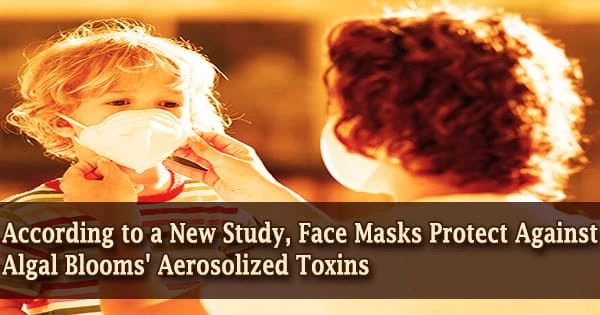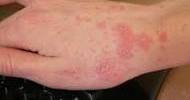Intense blooms of harmful algae are becoming more prevalent along Florida’s coast and elsewhere. According to the findings of a recent study headed by University of Miami (UM) researchers, wearing the face mask that everyone became accustomed to during the COVID-19 epidemic may also help guard against these airborne poisons.
Researchers at the University of Miami’s Rosenstiel School of Marine and Atmospheric Science devised an experiment to see how efficient conventional air conditioner filters and face masks are at filtering out toxins emitted during dangerous algal blooms.
“We found that face masks and air conditioner filters with high filter performance ratings can reduce the risk of exposure by filtering out small, toxin-containing particles,” said the study’s lead author Cassandra Gaston, an assistant professor of atmospheric sciences at the UM Rosenstiel School.
“These filter materials can also be effective at filtering out other kinds of small particles as well,” said Haley Royer, a co-first author of the study and Ph.D. student at the UM Rosenstiel School’s Department of Atmospheric Sciences. “As we all know by now, face masks are essential in preventing the transmission of COVID-19 from person to person.”
Aerosolization is a method of oxidatively converting and suspending particles or compositions in a moving stream of air in order to deliver the oxidized particles or composition to a specific place.
We found that face masks and air conditioner filters with high filter performance ratings can reduce the risk of exposure by filtering out small, toxin-containing particles.
Cassandra Gaston
Nutrient-rich runoff from agricultural and industrial waste that ends up in rivers exacerbates harmful algal blooms, also known as red tides and blue-green algae. The breaking of waves releases noxious particles into the air, resulting in airborne pollutants that cause major health concerns in people and marine animals.
Indoor air quality can be harmed by airborne contaminants, especially in companies and residences near polluted rivers. The researchers conducted the experiment by bubbling air into a liquid containing colonies of toxin-producing blue-green algae, Microcystis aeruginosa, to make airborne toxin-carrying particles in the lab.
Cutouts of three different types of face masks and six different types of AC filters were put in line with created particles to see how well the masks and filters prevented particles of various sizes.
N95, disposable surgical masks, and medical-grade, odor-filtering carbon fiber masks were employed by the researchers. The researchers utilized filters for window air conditioners and central air conditioners with varying filter performance ratings as AC filters.
AC filters were shown to filter out 20-90 percent of airborne particles, with particle filtration rising as the filter performance rating increased. Over 90% of toxin-containing particles were filtered out using face masks. The findings imply that low-cost, commercially accessible face masks and AC filters with high filtering efficiency ratings can help protect people from hazardous algal bloom toxins in the air both indoors and out.
Climate change and increasing fertilizer runoff from a growing human population are projected to make harmful algal blooms more common across the planet. An algal bloom, also known as an algae bloom, occurs when the population of algae in freshwater or marine water systems rapidly increases or accumulates. It is most usually used to describe the fast development of tiny unicellular algae, rather than macroscopic algae.
The finding also has implications for the spread of SARS-CoV-2, the virus that is causing the current COVID-19 epidemic, according to the researchers. The virus is 60-140 nanometers in size, which is similar to the size of the particles studied in this study.
The study, titled “Filtration Efficiency of Air Conditioner Filters and Face Masks to Limit Exposure to Aerosolized Algal Toxins,” was accepted for publication on April 20, 2021 in the journal Aerosol and Air Quality Research.
According to research, masks minimize the risks of spreading and receiving the coronavirus, and some studies suggest that if patients do develop the sickness, masks may reduce the severity of infection. Such research are predicated on the premise that mask laws are being followed and that individuals are wearing their masks properly. Furthermore, the adoption of masks frequently correlates with other modifications, such as gathering restrictions.
The study’s authors include: Cassandra Gaston, Haley Royer, Raymond Leibensperger III, Daniela Maizel, Kaycie Lanpher, Helena Solo-Gabriele, Larry Brand, R. Grace Zhai, Alberto Caban-Martinez, and Kimberly Popendorf from the University of Miami.
Funding for the study was provided by the UM Laboratory of Integrated Knowledge (U-LINK) and Florida Department of Health (DOH) project “Diversity and Innovation in Screening and Prevention of Exposure over the Long-term (DISPEL) to HABs.” The Department of Health provided cash to encourage the creation of visual and video assets for educating the public about HAB exposure reduction techniques.
















